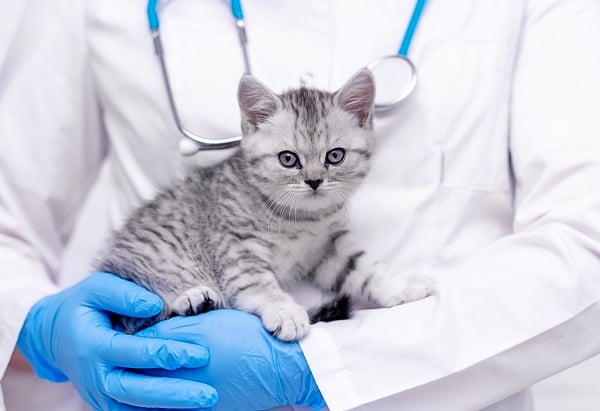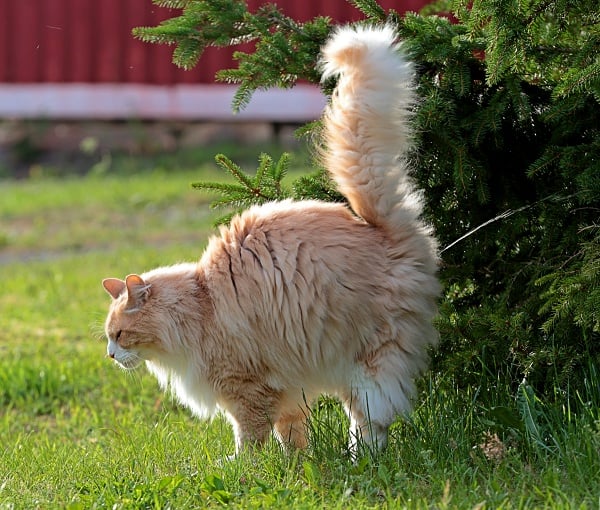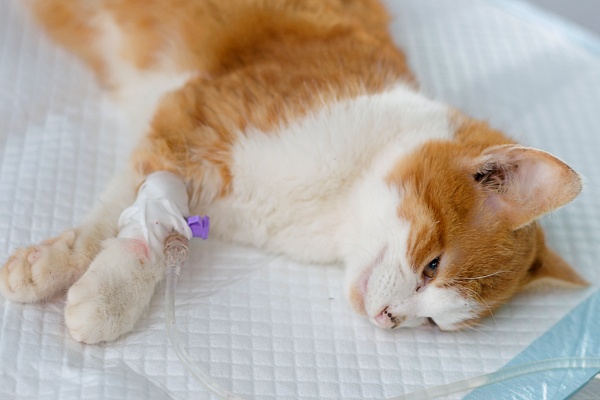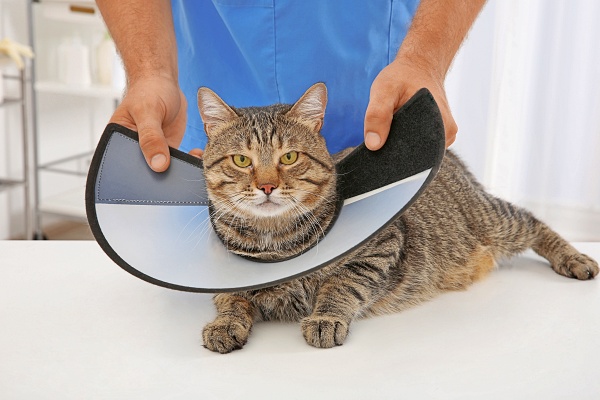Is your intact male cat’s sexual behaviors driving you crazy? Is your male feline friend acting like they are in heat or being aggressive? In our veterinary practice, male cat owners often ask what they can do to calm their male cat down. We recommend neutering when we meet with new male kitten and their owners. Neutering, also known as castration, is a surgical procedure to remove the testicles of a male. This removes the source of the hormonal influences that cause the unusual behaviors. It’s a safe and one of the most common surgeries that are performed under general anesthesia. As always, our articles are for informational purposes only, not medical advice. Please consult with your veterinarian for any questions or concerns regarding your pet.
In this article you’ll learn reasons to neuter your cat, behavioral changes after, benefits and risks, preparing for and caring for your cat after neutering surgery.

Table of Contents
Reasons to neuter your cat
There are many reasons to neuter your cat, including:
- To reduce unwanted behaviors. Neutering can help reduce or eliminate undesirable behaviors such as spraying, roaming, and fighting. These aggressive behaviors are often driven by testosterone, the hormone that is produced in the testicles.
- To prevent health problems. Neutering can help to prevent prostatitis and perianal tumors. Prostatitis is an inflammation of the prostate gland, and it can be caused by testosterone. Perianal tumors are tumors that develop around the anus, and they are more common in male cats than in female cats.
- To contribute to population control. Neutering helps to reduce the number of unwanted kittens. There are millions of homeless cats throughout the world and neutering is one of the most effective ways to reduce this population.
Neutering procedure
Neutering is a routine procedure that’s typically performed on an outpatient basis. This means that your cat can go home the same day. In our vet practice, we find that most of the time is used for the prep and post operative care. The actual surgery takes about 15-20 minutes to complete. So remember that in most clinics (including ours), you should expect time before and after the surgery for completing paperwork, preparing your cat (cleaning and shaving of their scrotum), and post-op recovery.
The actual procedure is pretty straightforward. Your veterinarian will make a small incision in your cat’s scrotum and remove the testicles. The incision will then be closed with sutures.
Behavioral changes after neutering

Most male cats will experience some behavioral changes after neutering. These changes are typically positive and include:
- Reduced spraying and roaming. Neutering reduces the production of testosterone, which is the hormone responsible for these behaviors.
- Reduced aggression. Neutering can help to make male cats more mellow and less aggressive. This is especially true in multi-cat households.
- Increased affection. Neutered cats are often more affectionate with their owners.
- Reduced risk of behavioral problems. Neutering can help to reduce the risk of behavioral problems such as anxiety and obsessive-compulsive disorder.
Physical Changes After Neutering
After neutering, your neutered male may experience some physical changes, such as:
- Weight gain. Neutered cats tend to be less active and have a slower metabolism, which can lead to weight gain. It is important to feed your neutered cat a high-quality diet and provide them with regular exercise.
- Reduced muscle mass. Neutering can also lead to a decrease in muscle mass. This is not typically a problem for most cats, but it is important to be aware of this potential side effect.
- Increased risk of urinary tract problems. Neutered males are at an increased risk of developing urinary tract problems, such as bladder stones and urethral obstruction. This is because neutering can lead to a narrowing of the urethra, the tube that carries urine from the bladder to the outside of the body.
Benefits of Neutering
Neutering has many health and behavioral benefits for both male cats and their owners. Some of these benefits include:
- Reduced risk of health problems. Neutering can help to prevent prostatitis and perianal tumors.
- Improved behavior. Neutering can help to reduce spraying, roaming, fighting, and aggression.
- Increased affection. Neutered cats are often more affectionate with their owners.
- Reduced risk of behavioral problems. Neutering can help to reduce the risk of behavioral problems such as anxiety and obsessive-compulsive disorder.
- Reduced financial costs. Neutering is a relatively inexpensive procedure, and it can help to save you money on veterinary bills in the long run.
Risks of Neutering

Neutering is a very safe procedure, but there are some potential risks, including:
Anesthesia risks. All surgeries carry some risk of anesthesia, but this risk is very low in healthy cats. The most common anesthesia-related complications are vomiting, diarrhea, and respiratory problems. These complications are usually mild and resolve quickly.
Surgical risks. Any surgery also carries some risk of complications, such as bleeding, infection, and suture failure. The risk of complications is low if your cat is healthy.
Urinary tract problems. As we mentioned before, neutered cats are at an increased risk of contracting illnesses of their urinary tract such as bladder stones and urethral obstruction. However, the risk of urinary tract problems is still relatively low, and there are things that you can do to reduce the risk, such as feeding your cat a high-quality diet and providing them with plenty of water.
Weight gain. Neutering won’t make your cat lazy and fat. Make sure to keep your cat active through play and climbing opportunities. Make sure to feed your cat a high quality diet and providing them with regular exercise after neutering. This will help to prevent weight gain and muscle loss.
Overall, the benefits of neutering far outweigh the risks. Neutering is a safe and beneficial procedure for male cats, and it is highly recommended by veterinarians.
Choosing the Right Age to Neuter Your Cat
The best age to neuter your male is between 6 and 12 months of age. This is when the testicles have descended and your cat is still young enough to recover quickly from the surgery. However, males can be neutered at any age, and even older cats can benefit from the procedure.
How to prepare for your cat’s neutering
Before neutering, your veterinarian will perform a physical exam and blood work to make sure that your cat is healthy enough for the neuter procedure. Your veterinarian will give you detailed instructions on how to prepare.
Here are some tips we give our pet parents on how to prepare for your their pets neutering:
- Schedule the surgery with your veterinarian. It is important to schedule the surgery well in advance so that your veterinarian can have time to assess your cat’s health and make sure that they are healthy enough for the procedure.
- Fast your cat for 12 hours before the surgery. This will help to prevent them from vomiting while under anesthesia.
- Provide your veterinarian with a complete medical history. This includes any medications that your cat is taking and any allergies that they have.
- Ask your veterinarian about any special instructions. There may be some things that you need to do to prepare your cat for this common procedure, such as giving them a bath or trimming their nails.
How long does it take to recover from general anesthetic from neutering
Most cats will recover from the general anesthetic used for neutering within 24-48 hours. However, some may take longer, up to 72 hours in some cases.

During the recovery period, it’s important to keep your cat quiet and comfortable. You should also monitor the incision site for any signs of infection.
Here are some tips for helping your cat recover from general anesthesia:
- Provide your cat with a quiet and comfortable place to rest.
- Make sure your cat has access to fresh water and food. He likely won’t be hungry in the hours after surgery. This isn’t a cause for concern as their lack of appetite is normal. Their normal appetite will slowly return as they go through the healing process.
- Monitor the incision site for any signs of infection, such as redness, swelling, or discharge. If you notice signs of infection contact your veterinarian immediately.
- Your male may not visit their litter box for a while. This is because they fasted prior to neutering and the general anesthetic affects their digestive tract. They should resume their normal activity within 24 to 48 hours.
- Provide only the cat pain medications prescribed by your vet. Do not give your him human long-lasting pain medications or any human medications unless specifically prescribed by your vet.
- Prevent your cat from licking or scratching at the incision site. You can do this by using an Elizabethan collar (also known as a cone. Or cone of shame if you are a Disney UP movie fan).
- Follow your veterinarian’s instructions carefully.
If you have any concerns about your cat’s recovery, please contact your veterinarian immediately.
Here are some additional things you can do to help your male recover from general anesthesia:
- Keep their environment warm and draft-free.
- Avoid playing with him and any strenuous activity until he’s fully recovered.
- If your cat has any difficulty urinating, please contact your veterinarian immediately.
How to help your cat recover

Most cats recover from neutering surgery within a 14 day recovery period. During this recovery period, it’s important to keep him quiet and comfortable. He’ll likely be sleepy for the first day or two. You should also monitor the incision site for any signs of infection, such as redness, swelling, discharge, or a bad smell.
It’s also important to keep your cat from licking or scratching at the incision site. Avoid bathing your pet until their incision has fully healed. The external sutures will be removed between 10 and 14 days by your veterinarian.
If you have other pets like we do, your pet may find being in their crate (if your cat is crate trained) with the door closed is most comfortable. They’ll feel safer and will let him get the rest he needs. If he isn’t crate trained, keeping your cat in a room with the door closed can help them to rest.
Your cats loss of appetite should end within 24 to 36 hours. Their digestive system will need that time to recover and get things moving. Offer him 1/4 of their normal meal size a few hours after surgery. They may ignore it but should slowly start eating.
Your cat may have a slight cough and a shaved forearm. These are because they were intubated where a breathing tube is inserted down their tracia to ensure they get the oxygen they need during surgery. Their forearm was shaved to insert an IV (intravenous fluid therapy) to keep your cat hydrated. Their cough should resolve in a day or two and their fur should grow back where the IV was inserted.
Conclusion
Neutering is a safe and beneficial procedure for male cats. It can help to prevent health problems, improve behavior, and reduce the risk of behavioral problems. If you are considering neutering your male, please talk to your veterinarian. They can help you to decide if neutering is right for your cat and can answer any questions that you have about the procedure. For us, it was the solution in stopping one of our males from spraying inside the house, which drove us crazy.
You’ve learned the reasons to neuter your cat, behavioral changes after, benefits and risks, preparing for and caring for them after neutering surgery. This will go a long way towards ensuring your male four legged fur ball of a pet is healthy and happy before, during, and after their neutering surgery. And keeping your Pet Happy is what we all want.
FAQ
Question: Is neutering the only way to address unwanted behaviors in male cats?
Answer: No. Neutering is one effective way to address unwanted behaviors in male cats, but it’s not the only option. Behavioral training, environmental enrichment, and understanding your cat’s needs can also help improve behavior.
Question: Can neutering be performed at any age?
Answer: Yes. Cats can be neutered at any age. While the ideal age for neutering is typically between 6 and 12 months, cats can be neutered at any age, including older cats. The timing may depend on your cat’s health and circumstances.
Question: What are the potential risks of neutering surgery?
Answer: Neutering is generally safe, but there are some risks, including anesthesia-related complications, surgical risks like bleeding or infection, and an increased risk of urinary tract problems in some cases. These risks are typically low, and your veterinarian can provide more information.
Question: How long does it take for a cat to recover from neutering surgery?
Answer: Most cats recover from neutering surgery within 24 to 48 hours. However, some may take up to 72 hours. It’s essential to provide a quiet, comfortable environment, monitor the incision site, and follow your veterinarian’s instructions for a smooth recovery.
Question: Can I prevent my cat from licking the incision site after neutering?
Answer: Yes, you can prevent your cat from licking or scratching the incision site by using an Elizabethan collar (cone) or even by putting a t-shirt on your cat backward. This helps protect the incision and aids in healing.
Question: What should I do if my cat refuses to eat after neutering?
Answer: It’s normal for cats to have a reduced appetite in the hours after surgery. Offer your cat a small portion of their regular food a few hours after surgery. If they continue to refuse food beyond 24 to 36 hours, consult your veterinarian for guidance on encouraging eating.
